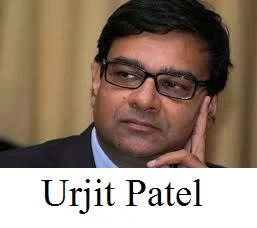Biography of Urjit Patel | Early Life and Educational Background - IMF and Deputy Governor of RBI - Post-Governorship Resignation of Urjit Patel
Biography of Urjit Patel:
Urjit Patel is an Indian economist who served as the 24th Governor of the Reserve Bank of India from 2016 to 2018. He was also the Deputy Governor of the Reserve Bank of India, looking after monetary policy, economic research, financial markets, statistics and information management.
Patel was born in Nairobi, Kenya on October 28, 1963, to Manjula and Ravindra Patel. His grandfather had migrated from Mahudha village in Kheda district, Gujarat to Kenya in the 20th century. He studied at the London School of Economics for a Bachelor of Science degree in 1984. He obtained an M.Phil. degree from University of Oxford in 1986. He was conferred a Ph.D. in economics from Yale University in 1990.
After obtaining his Ph.D., Patel joined the International Monetary Fund (IMF) in 1990, where he worked on the US, India, Bahamas and Myanmar desks till 1995. Thereafter he went on deputation from the IMF to the Reserve Bank of India (RBI), where he played an advisory role in the development of the debt market, banking sector reforms, pension fund reforms, and targeting of real exchange rate. Between 2000 and 2004, Patel worked with several High-Level Committees at both Central and State Government levels.
Currently, Patel serves as the Chairman of National Institute of Public Finance and Policy, additional director of Britannia Industries and independent director of John Cockerill India.
Brief biography of Urjit Patel:
Urjit R. Patel is an Indian economist and central banker who served as the 24th Governor of the Reserve Bank of India (RBI).
Here is an overview of his biography:
Early Life:
Urjit Ravindra Patel was born on October 28, 1963, in Nairobi, Kenya.
His family later moved to India, where he pursued his education.
Educational Background:
Patel holds a Bachelor's degree in Economics from the London School of Economics.
He earned a Master's degree in Economics from the University of Oxford.
Patel also obtained a Doctorate in Economics from Yale University.
Career in Academia:
Before entering the public sector, Patel had an accomplished career in academia.
He worked as an assistant professor at the Indian Institute of Management Ahmedabad (IIMA).
Patel has also been associated with other prestigious educational institutions and research organizations.
International Monetary Fund (IMF):
Patel served at the International Monetary Fund (IMF) from 1990 to 1995.
During his time at the IMF, he worked on various assignments, including those related to the USA, India, Bahamas, and Myanmar desks.
RBI and Policy Roles:
Urjit Patel joined the RBI in 1996 and held various roles, including Chief Economist.
He played a crucial role in the formulation of the monetary policy in India.
Patel chaired the committee that recommended the adoption of inflation targeting as the framework for the monetary policy.
Deputy Governor of RBI:
Patel was appointed as the Deputy Governor of the RBI in 2013.
He looked after the monetary policy, economic policy research, statistics and information management, deposit insurance, communication, and Right to Information (RTI) divisions.
RBI Governorship:
On September 4, 2016, Urjit Patel became the Governor of the RBI, succeeding Raghuram Rajan.
He faced challenges, including the demonetization of high-denomination currency notes in November 2016.
Patel focused on maintaining financial stability, addressing non-performing assets (NPAs), and implementing various reforms.
Resignation:
Urjit Patel resigned from the position of RBI Governor on December 10, 2018, citing personal reasons.
His resignation came amid reported differences between the RBI and the government on various policy matters.
Post-Governorship:
After stepping down as the RBI Governor, Patel has been involved in various economic and financial forums.
He has shared his insights on issues related to the Indian economy and global economic trends.
Urjit Patel's tenure as the RBI Governor marked a period of significant economic policy changes and challenges. His contributions to the formulation of monetary policy and his experience in both academia and international financial institutions have shaped his legacy in the field of economics and central banking.


Comments
Post a Comment